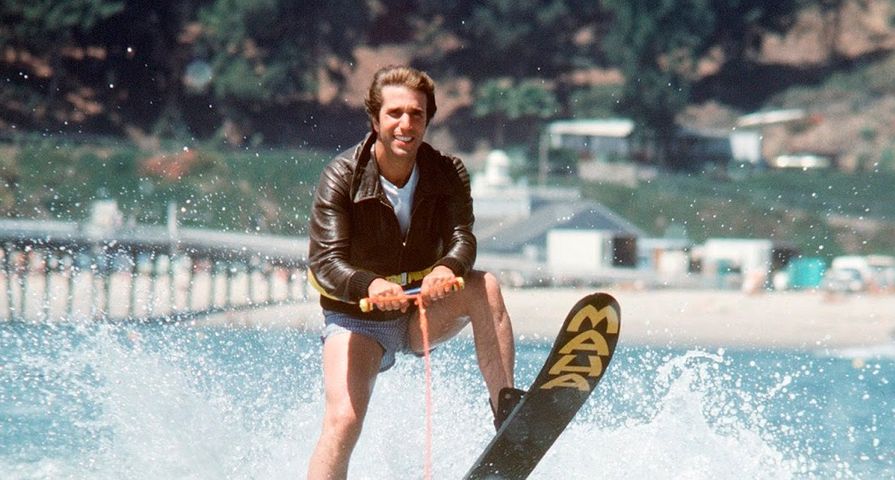
It seemed like such a great idea.
The creators of Happy Days, America’s top-rated TV show, decided to launch their fifth season by sending the fictional Cunningham family and their closest friends to Hollywood. What adventures might ensue?
Arthur Fonzarelli (“the Fonz”), played by Henry Winkler, had originally been merely an eccentric background character. But after a few years he had displaced Richie Cunningham (played by future film director Ron Howard) as the heart and soul of the series, and had arguably become the biggest star on television.
In real life, Winkler was an exceptional water skier. Chief writer Fred Fox Jr. decided that for the September 20, 1977, season debut, Fonzie – who never backed down from a challenge – would shoot up a ski jump and fly over a large, confined shark. Wearing his trademark black leather jacket, he perfectly executes the maneuver over the giant predator.
That was so cool.
Except that a significant number of viewers actually thought it was kind of dumb.
No one realized it at the time, but a new phrase had just entered America’s cultural lexicon. “Jumping the shark” means you’ve taken things a bit too far. You’ve reached your peak, and now you’re going downhill. You were a little too desperate to keep things interesting, and in the process you managed to make yourself less interesting.
Happy Days soldiered on for seven more seasons. But even its most loyal fans concluded that when a sitcom dedicated to adolescent growing pains in Milwaukee has to conjure up a shark, it’s lost its sweet way.
TV shows aren’t the only entities that resort to gimmicks when they’ve exhausted their original creativity. Corporations, commercial brands, and political movements are all in danger of jumping the shark.
So are churches.
One of the greatest temptations for followers of Jesus is to conclude that “Jesus alone” is, well, kind of boring. We need Jesus and. Jesus and a better music program. Jesus and cutting edge technology. Jesus and eye-catching media. Jesus and a message that will bring in children, teenagers, single adults, seniors, artists – insert your preferred affinity group here.
During my congregational leadership days, our staff decided to poll our worship attenders.
The previous year we had added large drop-down screens, Power Point technology, and clips from Hollywood films to serve as sermon illustrations. We had made significant investments in musical instrumentation and digital sound. I had preached sermon series on emotions, parenting, family life, and getting along with high maintenance people.
At the heart of the survey we asked, “What’s missing from our worship? What would you most like to experience on a Sunday morning?”
I was stunned at the number one answer: More silence, please.
The members of our congregation wanted less clutter and less noise. More conversation with God and fewer high-energy announcements. All week long they had been bombarded with commercial jingles, product pitches, and exhortations to be successful. Their souls were weary, and they longed to be still and know that God was God.
Amazingly, it had been the mission of our church from Day One to provide just such a spiritual oasis.
But I had concluded that we needed more than Jesus to provide such an experience. We needed Jesus and Something Else. Maybe lots of Something Else’s.
We had jumped the shark.
Happy Days couldn’t take back the episode that made their biggest star look silly.
But with God’s help we can recover the wonder, beauty, and sheer simplicity of placing ourselves in Christ’s presence. And deciding to stay there for the sake of our weary hearts.
As we learn how to do that, our happiest days will surely lie ahead of us.
